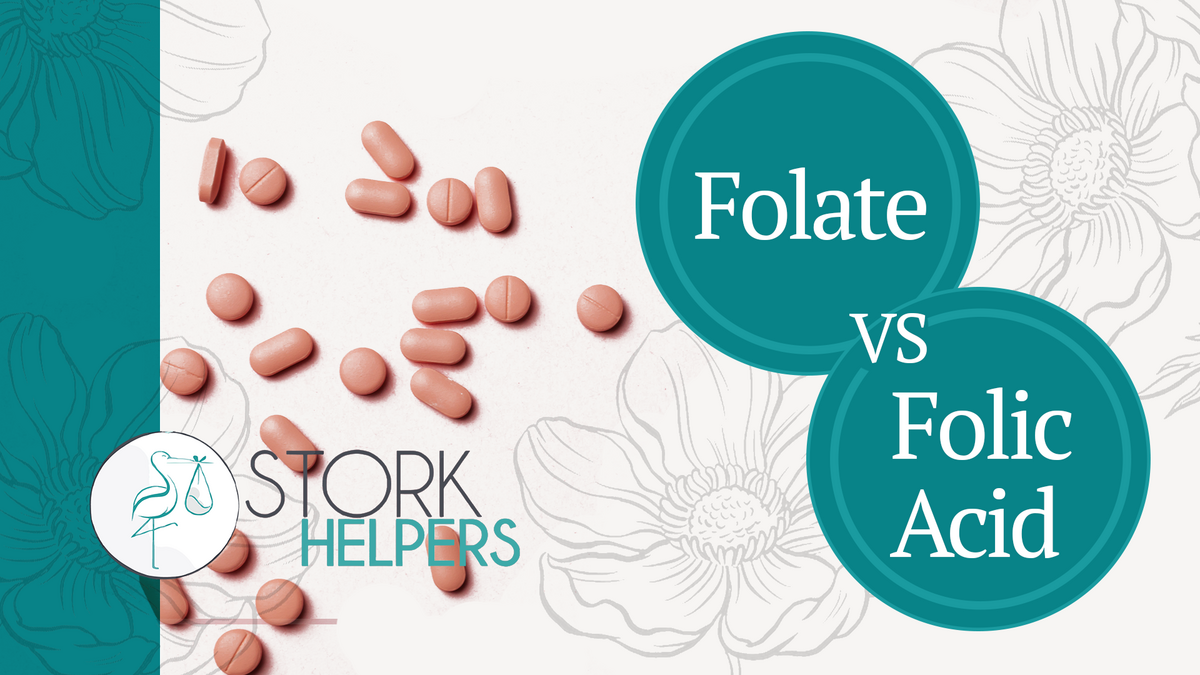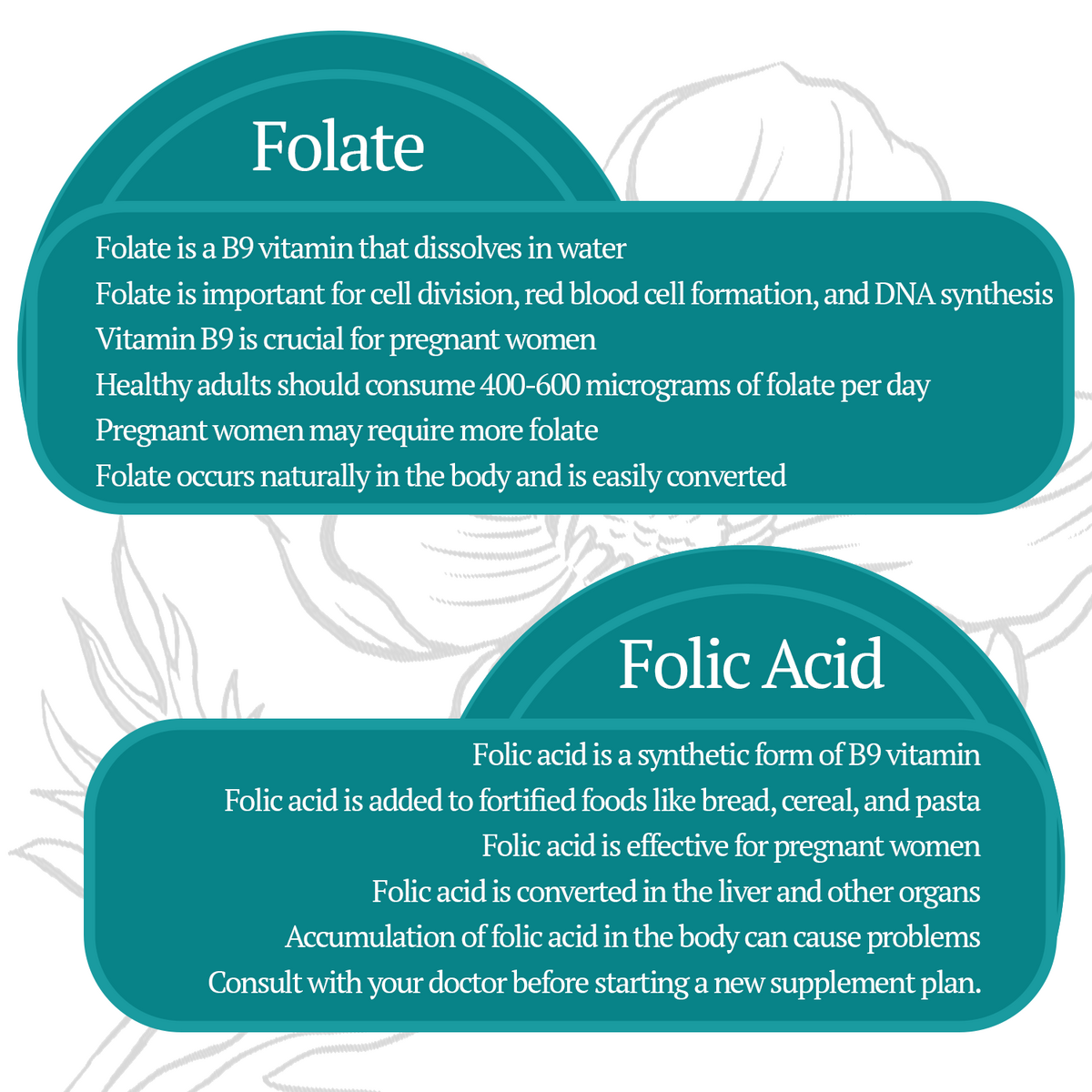Folate Vs. Folic Acid Prenatal Vitamins: Which is Better?

Many mamas wonder about the importance of taking prenatal vitamins during pregnancy. For many mamas, daily supplements can have a big impact on how she feels and her nutritional intake.
However, not all prenatal supplements are created equal. The type of B9 vitamin you take (folic acid vs folate), can have a big impact on both your and your baby’s health.
Not every mama will have the same needs during pregnancy, so it is important that you weigh each option before choosing which prenatal vitamin is right for you.
What is the importance of prenatal vitamins? Read this guide to find out more!
In this post, we will discuss the advantages of both folic acid and folate and how you can tell which option is best for you and your needs!
What is the Difference Between Folate and Folic Acid?
Vitamins are important for expecting mamas. They provide key nutrients that she and her baby may otherwise be missing out on. The most common prenatal vitamins include folic acid, folate, iron, and calcium, all of which are essential for a healthy pregnancy.
Want to learn more about prenatal vitamins? This is the guide for you!
Both folate and folic acid are a form of vitamin B9 (found in leafy greens, citrus fruits, and legumes), which is essential for proper fetal development. Taking vitamin B9 is important before conception and during pregnancy to help prevent neural tube defects in the developing fetus.
Folate and folic acid are very similar, but there are a few key differences that may help you decide upon which option is best for you!
Let’s look at the benefits of each as well as what separates the two forms of B9 vitamins.

Folate
Folate is a B9 vitamin that can dissolve in water. That is important in the process of cell division, red blood cell formation, and DNA synthesis, because of this, vitamin B9 is extremely important for pregnant mamas.
Folate rich foods include dark leafy greens, beans, mushrooms, citrus fruits, fortified cereals, legumes, and meat.
Healthy adults consume 400-600 micrograms of folate per day. However, during pregnancy, this need may arise.
Since folate occurs naturally the body can easily break it down and convert it.
Folic Acid
Folic acid is also a B9 vitamin. The key difference between folate and folic acid supplements is that while folate is found naturally in foods, folic acid is a synthetic addition to food that acts the same way as folate.
Folic acid is often added to fortified foods such as bread, cereal, and pasta.
As a B9 vitamin, folic acid plays a key role in red blood cell production, DNA synthesis, and cell division. Because of this, it is a highly effective supplement for pregnant mamas.
However, unlike folate (which converts to B9 in your digestive tract), folic acid is converted in your liver and other organs.
If your body has a problem breaking down folic acid, it can accumulate in your system, which can cause problems down the line. So, as always, be sure to talk with your doctor before starting a new supplement plan.
So, what is best for me?
When it comes to the debate on folate versus folic acid, we recommend folate as the preferred B9 supplement. Folate occurs naturally in the body making it easy to convert to B9, helping the health of the baby and mama during pregnancy. However, folic acid is a perfectly acceptable prenatal vitamin.
Whichever option you choose, B9 supplements are a highly recommended prenatal vitamin for expecting mamas. Just be sure you are taking vitamin B9 supplements in addition to folate rich foods for the best results.
Other Helpful Info for Folate and Folic Acid Benefits
Now that we understand the difference between folate and folic acid, let’s look at ways to take B9 supplements, as well as when you might consider starting a B9 supplement plan.
What are the best ways to consume vitamin B9?
There are two ways to consume vitamin B9. You can either eat it in food or supplements.
Natural sources of folate include vegetables (especially dark, leafy greens), fruits, fruit juice, nuts, beans, peas, seafood, eggs, dairy products, meat, poultry, and grains. Eating unprocessed or minimally processed versions of these foods is key for maximizing the folate benefits you can receive.
When should I start taking vitamin B9 supplements?
It is generally advised that you start taking B9 supplements approximately one month before you begin trying to conceive. Then continue taking folic acid or folate supplements throughout at least the first trimester of your pregnancy.
Vitamin B9 is essential for the proper formation of neural tubes, which eventually develop into a baby’s brain and spinal cords. Neural tubes form in the first few weeks of pregnancy, often before you even know you are pregnant.
What nutrients do mamas need during pregnancy? Learn more here!
Pregnancy Support in Cincinnati and Dayton from Stork Helpers
Pregnancy is one of the most joyous and difficult times in a person’s life. Because of that, mamas need all the support they can get.
If you feel as though you could use an experienced guide to help you determine what is right for you, then the Stork Helpers team is here!
Skylar and Tamara are experienced doulas who have helped mamas just like you learn more about their changing bodies and how to best care for the baby growing inside of them.
Always listening, never judging Stork Helpers is here for you! Click here to start the conversation with your doula today!
For more tips for a healthy pregnancy and better peace of mind, follow Stork Helpers on Facebook, and LinkedIn!
Happy with the difference Stork Helpers has made in your life? Leave us a five-star review on Google here!

